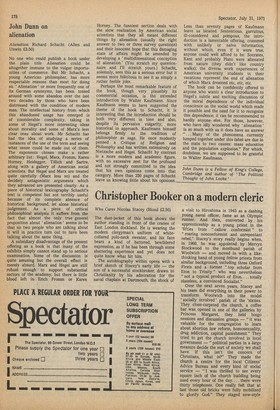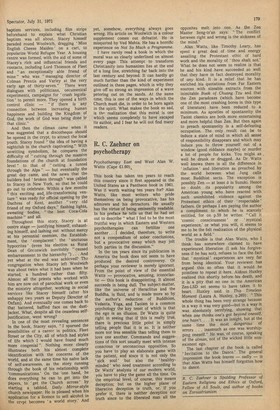Christopher Booker on a modern cleric
Who Cares Nicolas Stacey (Blond £2.50) The dust-jacket of this book shows the author standing in front of the cranes of East London dockland. He is wearing the modern clergyman's uniform of whitecollared polo-neck sweater, and his face bears a kind of battered, bewildered expression, as if he has been through some shattering experience and yet does not quite know what hit him.
The autobiography within opens with a brief sketch of Stacey's early life — the son of a successful stockbroker, drawn to Christianity by his admiration for the naval chaplain at Dartmouth, the shock of a visit to Hiroshima in 1945 as a dashing young naval officer, fame as an Olympic runner. And then, converted by his apprenticeship as a young priest in the 'fifties from "callow conformist" to "roaring nonconformist and unrepentant rebel," Stacey's story really begins when, in 1960, he was appointed by Mervyn Stockwood to the moribund parish of Woolwich — and moved in with a likethinking band of young fellow priests from similar background, including three Oxford Firsts and a former "top scholar from Eton to Trinity" who was nevertheless "not a typical product of Eton.... totally classless, a convinced Socialist."
Over the next seven years, Stacey and his team did everything in their power to transform Woolwich into the model 'socially involved' parish of the 'sixties. They close-carpeted the church, a coffee bar was opened in one of the galleries by Princess Margaret, they held bingo sessions and discussion groups — "'it was valuable for the congregation to learn about abortion law reform, homosexuality, drug addiction, capital punishment." They tried to get the church involved in local government — "political parties in a large measure decide the sort of society we shall have. If this isn't the concern of Christians, what is?" They made the church a centre for the local Citizens' Advice Bureau and every kind of social service — "I was thrilled to see every square inch of the church building being used every hour of the day.... there were thirty telephones. One really felt that at last those old bricks were fully mobilised to glorify God." They staged new-style
baptism services, including film strips beforehand to explain what Christian baptism was all about. Stacey himself paraded round Woolwich, dragging 'Miss English Cheese Maiden ' on a cart, to popularize World Refugee Year. A housing centre was formed, with the aid of some of Stacey's rich and influential friends and contacts, including Lord Thomson of Fleet and "an exceptionally able friend of mine" who was " managing director of Colman Prentis and Varley at the very early age of thirty-seven." There were dialogues with politicians, oecumenical experiments, campaigns for 'crash legislation' to permit more. They opened a birth control clinic — "if there is any connection between increasing human happiness and building the Kingdom of God, the work of God was being done ip that clinic."
And then the climax came when it was suggested that a discotheque should be opened in the crypt, to attract the local youth. Stacey found "the idea of having a nightclub in the church captivating." With unwitting symbolism, he compares the difficulty of " cutting through the massive foundations of the church at foundation level " to that of " cutting a tunnel through the Alps" — but eventually the great day came, and the news that the builders had 'broken through' was cabled to Stacey in New York, so that he could go out to celebrate. Within a few months "this exciting and, life-transforming venture" was ready for official opening by the Duchess of Kent, another " very old friend of my Oxford days," flashing lights, sweating bodies, "the best Coca-Cola machine" and all.
Throughout this story, Stacey is at centre stage — justifying himself, exhausting himself, and lashing out without mercy at his perennial enemies, the Establishment, the ' complacent ' the 'unctuous hypocrites ' (even his election as Rural Dean of Greenwich inevitably "caused embarrassment to the hierarchy ") . . And yet what at the end was achieved? The congregation when Stacey left Woolwich was about twice what it had been when he started, a hundred rather than fifty. Almost all the priests who worked with him are now out of parochial work or even the ministry altogether, working in social services like Stacey himself (after his unhappy two years as Deputy Director of Oxfam). And eventually one comes back to that battered, baffled face on the dustjacket. What, despite all the ceaseless selfjustification, went wrong?
In one of the most revealing sentences in the book, Stacey says, "I spurned the possibilities of a career in politics, Fleet Street or the City, all of which had styles of life which I would have found much more congenial ". Nothing more clearly illustrates both •his almost complete identification with the concerns of the world, and at the same time his naive lack of self-awareness, as the story running through the book of his relationship with 'communications.' On the one hand, he does everything he can to get into the papers, to 'get the Church across' by starting a tabloid, Daily Mirror-style church newspaper. He is pleased when his application for a licence to sell alcohol in the crypt becomes 'a world story.' And yet, somehow, everything always goes wrong. His article on Woolwich in a colour supplement comes out defeatist. He is misquoted by Ved Mehta. He has a horrific experience on Not So Much a Programme.
I have rarely read a book in which the moral was so clearly underlined on almost every page. This attempt to transform Christianity into humanism lies at the end of a long line, stretching far back into the last century and beyond. It can hardly go much further than the kind of experiment outlined in these pages, which is why they give off so strong an impression of a wave petering out on the sands. At the same time, this is one of the ways in which the Church must die, in order to be born again in the spirit. What makes the book so sad, is tho realization that this moral is one which seems completely to have escaped its author, and I fear he will not find many readers.











































 Previous page
Previous page